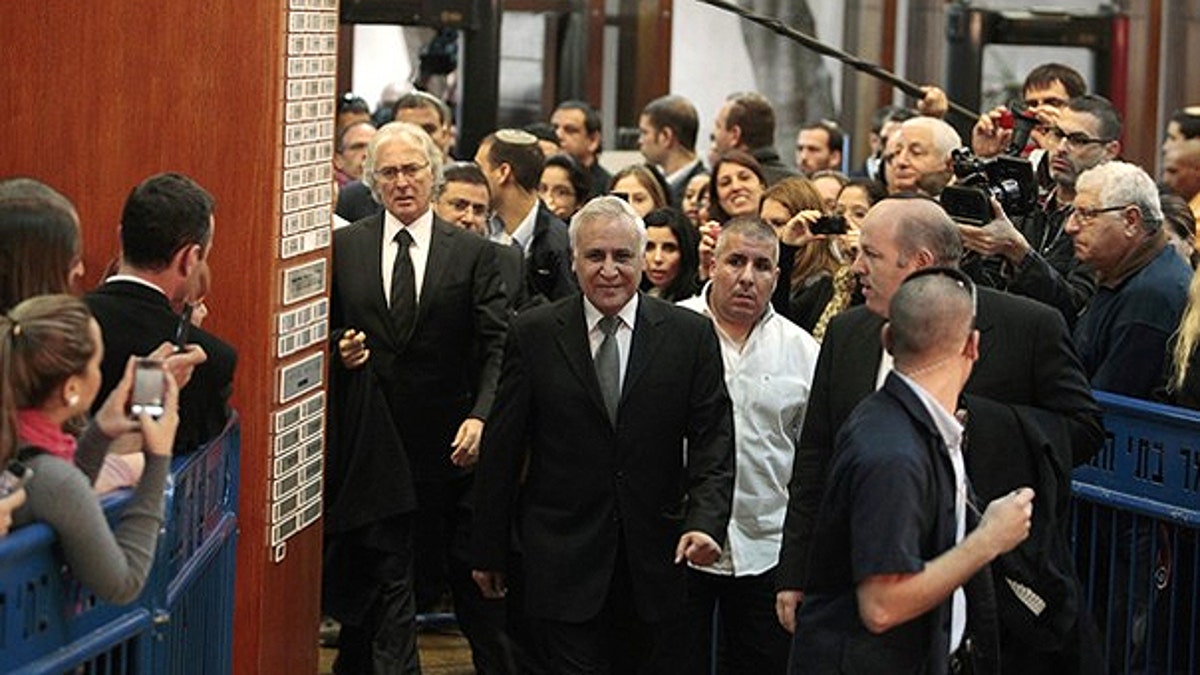
Dec. 30: Israel's former president Moshe Katsav (C) arrives at Tel Aviv District Court to hear the verdict on charges of rape and sexual misconduct against him. (Reuters)
JERUSALEM – Former Israel President Moshe Katsav was convicted Thursday of raping an employee when he was a Cabinet minister, the most serious criminal charges ever brought against a high-ranking official and a case that shocked the nation.
Katsav, 65, likely faces from four to 16 years in prison for the crimes, which included two counts of raping an employee in 1998 when he was tourism minister and lesser counts of indecent acts and sexual harassment involving two other women who worked for him when he was president.
Katsav served as a minister in several right-wing Likud governments before he was elected president, a largely ceremonial post, in 2000. He has denied the rape charges, claiming he was a victim of a political witch hunt and suggesting he was targeted because he comes from Israel's Sephardic community. Sephardic Jews, of Middle Eastern origin, were for decades an underclass. Katsav was born in Iran and immigrated to Israel as a child.
A somber Katsav left the courtroom without commenting, surrounded by his legal team. He was ordered to surrender his passport while awaiting sentencing at a date that has not yet been set.
Katsav can appeal the verdict, but legal experts said Israel's Supreme Court was unlikely to overturn such a sweeping conviction. A presidential pardon is also highly unlikely because of the severity of the offenses. In his ruling, the judge said Katsav's defense was full of lies.
Katsav's son Boaz vowed his father would clear his name.
"We will continue to walk with our heads high and all the nation ... with God's help, will know that father, the eighth president of the state of Israel, is innocent," he said.
One of Katsav's lawyers, Avigdor Feldman, said he hopes his client will appeal, but he has not yet decided how to proceed. "I don't know how strong he is, how long he can continue this saga," Feldman said.
Katsav's case initially broke in 2006, when the then-president complained that a female employee was extorting him. The woman then went to police with her side of the story, detailing a series of sexual assaults and prompting other women to come forward with similar complaints.
According to the indictment, Katsav forced one woman to the floor of his office at the Tourism Ministry in 1998 and raped her. A second time that year, he summoned her to a Jerusalem hotel to go over paperwork and raped her on the bed in his room. The indictment alleged that Katsav tried to calm his victim by saying: "Relax, you'll enjoy it."
The indictment also alleged that he harassed two women during his term as president, embracing them against their will and making unwanted sexual comments.
On Katsav's 60th birthday in 2005, an assistant offered congratulations. He then hugged her at length, sniffing her neck, according to the indictment. She complained to police, and the indictment said Katsav later tried to persuade her to change her testimony, earning him an additional charge of obstruction of justice.
The conviction by a three-judge panel was widely praised as a victory for Israel's legal system and for women's rights.
"The court sent two clear and sharp messages: that everyone is equal and every woman has the full right to her body," Prime Minister Benjamin Netanyahu said in a statement. He called the verdict a sad day for Israel and its citizens.
The conviction capped a four-and-a-half year saga that stunned Israelis, both with its lurid details and bizarre twists and turns.
Katsav resigned in 2007, two weeks before his seven-year term expired, under a plea bargain that would have required him to admit to lesser charges of sexual misconduct. He was replaced by former prime minister Shimon Peres.
But in a dramatic reversal in April 2009, Katsav rejected the deal, which would have kept him out of jail, and vowed to clear his name in court.
Around that time, he held a bizarre news conference in which he lashed out at prosecutors and the media and denied any wrongdoing. His erratic behavior, in which he shook in anger, waved a computer disc that he said proved his innocence and screamed at reporters in the room, raised questions about his state of mind at the time.
The president in Israel is head of state but a largely ceremonial post, representing the country at ceremonies around the world. The post, filled by parliament, is traditionally given to an elder statesman as a reward for years of public service.
Katsav's case sparked a high-profile campaign by woman's right groups. On Thursday, hundreds of women stood outside the courtroom holding signs against Katsav and chanting: "The whole nation knows Katsav is a criminal."
Prosecutor Ronit Amiel said the verdict sent a strong message that victims of abuse of power should not keep silent.
"This day is not a happy day. It is not an easy day," she said.
Oren Gazal-Ayal, a professor of criminal justice at Haifa University, called the verdict a "badge of honor" for the country's legal system.
"I think we should be very proud of the Israeli justice system," he said. He said that while Katsav's crimes could carry a total of nearly 40 years in prison, under Israel's legal practices, sentences are served concurrently, so the maximum penalty would not exceed 16 years, the top penalty for the rape convictions.
The conviction was the latest in a series of high-profile cases against Israeli officials.
Former Israeli Finance Minister Avraham Hirchson is currently in prison after being convicted of embezzling more than $600,000 from a workers union. Former Justice Minister Haim Ramon was convicted in March 2007 of forcibly kissing a female soldier. Former Prime Minister Ehud Olmert is currently standing trial on corruption charges.
